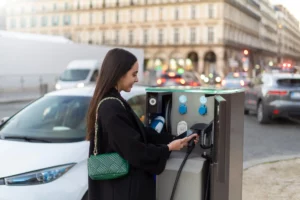
Home / EV Charging News / Electric Car Charging Infrastructure and Green Building Certifications
In the pursuit of a sustainable future, electric vehicles (EVs) are emerging as key players in transportation. This article explores the harmonious relationship between electric car charging infrastructure and green building certifications, shedding light on how the installation of EV charging stations aligns seamlessly with broader sustainability objectives.
Green building certifications, notably LEED (Leadership in Energy and Environmental Design) and BREEAM (Building Research Establishment Environmental Assessment Method), embody a commitment to sustainable building practices. These certifications extend beyond energy efficiency, encompassing areas such as water conservation, indoor air quality, and holistic environmental responsibility.
As societies increasingly prioritize sustainability, there is a notable shift towards green infrastructure. Buildings are now evaluated not just for their structural integrity but also for their environmental impact. Green building certifications serve as markers of a commitment to creating structures that minimize resource consumption and reduce their overall ecological footprint.
The integration of electric car charging infrastructure into green building initiatives is a natural progression in sustainable urban planning. EV charging stations complement the ethos of green buildings by promoting clean transportation and reducing reliance on traditional fossil fuels. This dual-purpose approach contributes significantly to the overall sustainability goals of a building or development project.
Electric car charging infrastructure, when implemented strategically, enhances energy efficiency within a building or a community. By leveraging renewable energy sources or optimizing charging times during off-peak hours, the impact on the overall energy grid is minimized. This approach aligns with the principles of green building certifications, emphasizing responsible energy use and conservation.
The inclusion of EV charging stations within the framework of green building certifications actively promotes alternative transportation solutions. It encourages a shift away from traditional vehicles powered by fossil fuels, thereby reducing greenhouse gas emissions and supporting cleaner air quality. This aspect of sustainable mobility is integral to the broader vision of green building practices.
Beyond individual buildings, the installation of electric car charging infrastructure has a positive impact on communities and workplaces. It fosters a culture of sustainability, providing tangible support for electric vehicle owners. This amenity can influence transportation choices, making EV adoption more appealing and contributing to a collective reduction in carbon emissions.
Looking ahead, the integration of electric car charging infrastructure into green building practices holds promising implications for the future. As electric vehicles become more mainstream, the demand for accessible and sustainable charging options will grow. Green building certifications are likely to evolve to include specific criteria related to the implementation and efficiency of EV charging stations, further encouraging their widespread adoption.
The future of electric car charging infrastructure lies not only in its expansion but also in technological advancements. Smart charging solutions, equipped with connectivity features and artificial intelligence, can optimize energy consumption, reduce peak load on the grid, and enhance the overall efficiency of EV charging. These innovations align seamlessly with the principles of green building certifications by promoting energy intelligence and adaptability.
Government initiatives play a pivotal role in shaping the trajectory of sustainable infrastructure. Incentives for green building practices and electric vehicle adoption, combined with regulations mandating the inclusion of EV charging stations in new developments, will further solidify the integration of electric car charging into the fabric of green building projects. Such policies create a conducive environment for sustainable urban planning.
The successful integration of electric car charging infrastructure into green building initiatives requires collaboration and engagement from various stakeholders. Educating architects, developers, and building owners about the benefits of incorporating EV charging stations is essential. Additionally, involving local communities in the decision-making process fosters a sense of ownership and encourages a shared commitment to sustainability.
The intersection of electric car charging infrastructure and green building certifications is not confined to a specific region. It reflects a global shift towards sustainable urban development. International collaboration and the sharing of best practices will accelerate the adoption of green building standards with integrated EV charging, creating a network of environmentally conscious communities around the world.
In conclusion, the convergence of electric car charging infrastructure and green building certifications represents a confluence of innovation and sustainability. As buildings evolve from static structures to dynamic contributors to environmental well-being, the integration of EV charging stations becomes a symbol of progress. It is a tangible step towards a future where our urban landscapes harmonize with nature, and sustainable practices become integral to the way we design, build, and inhabit our cities. As the journey towards a greener tomorrow continues, the relationship between electric vehicles and green buildings will undoubtedly play a pivotal role in shaping a more sustainable and resilient world.
